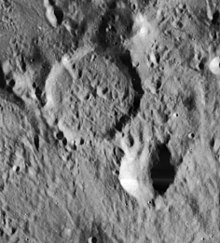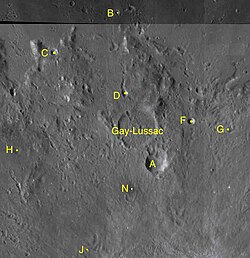盖-吕萨克陨坑

| 盖-吕萨克陨石坑 | |
|---|---|
 月球轨道器4号拍摄的盖-吕萨克陨石坑(左上)及卫星坑"盖-吕萨克 A"(右下) | |
| 纬度 | 13.88°N |
| 经度 | 20.79°W |
| 直径 | 25.4公里 |
| 深度 | 0.86公里 |
| 余经 | 日出时21° |
| 命名来源 | 约瑟夫·路易·盖-吕萨克 |
盖-吕萨克陨石坑(Gay-Lussac)是月球正面位于喀尔巴阡山脉南麓的一座小撞击坑,以法国物理及化学家约瑟夫·路易·盖-吕萨克(1778年-1850年)的名字命名,1935年该名称被国际天文联合会批准接受。
描述
[编辑]该陨坑西北偏西与托·迈耶环形山相邻、北面接近皮西亚斯陨石坑、厄拉多塞陨石坑位于它的东侧、东南方有斯塔迪乌斯陨石坑、东南偏南以及南面,分别坐落着巨大的里乔利环形山和哥白尼环形山。蜿蜒的喀尔巴阡山脉横亘在陨坑北侧,它的后面则是雨海;往东南则是坐落在岛海东北的浪湾[1]。该陨坑中心的月面坐标为13°53′N 20°47′W / 13.88°N 20.79°W,直径25.4公里[2], 深度0.86公里[3]。
该陨坑外观略有变形大体接近圆状,坑壁磨损明显,布满众多撞击坑。坑壁平均高出周边地形870米[4],内部容积约440公里³[4]。碗状的坑底崎岖不平,分布有大小不同的各种陨坑,中心点位置无中央峰而是一对凹坑。卫星坑"盖-吕萨克 A"几乎连接在它的东南边缘;西南是一条被命名为"盖-吕萨克月溪"(Rima Gay-Lussac)的宽阔月沟,从西南到东北笔直绵延40公里,末端则有弯曲。
盖-吕萨克陨石坑已被月球和行星天文协会(ALPO)列入《带有明亮射纹系统的撞击坑列表》)[5]。
陨坑截面图
[编辑]该图显示了陨石坑不同方向上的截面部位[6],纵向坐标轴(Y轴)单位为英尺,右上方图显示的比例尺为米。
卫星陨石坑
[编辑]按照惯例,最靠近盖-吕萨克陨石坑的卫星坑在月图上以字母标注在该坑中心点的旁边。

| 盖-吕萨克 | 纬度 | 经度 | 直径 |
|---|---|---|---|
| A | 13.2° N | 20.4° W | 15 公里 |
| B | 16.2° N | 21.1° W | 3 公里 |
| C | 15.4° N | 22.5° W | 5 公里 |
| D | 14.6° N | 21.0° W | 5 公里 |
| F | 14.0° N | 19.6° W | 5 公里 |
| G | 13.8° N | 18.9° W | 5 公里 |
| H | 13.4° N | 23.2° W | 5 公里 |
| J | 11.7° N | 21.7° W | 3 公里 |
| N | 12.6° N | 20.9° W | 2 公里 |
参考文献
[编辑]- ^ Gay-Lussac crater on the LAC-58 map (PDF). [2016-06-05]. (原始内容存档 (PDF)于2016-03-05).
- ^ Directory of the International Astronomical Union. [2016-06-05]. (原始内容存档于2018-06-29).
- ^ John E. Westfall's Atlas of the Lunar Terminator, Cambridge Univ. Press (2000). [2016-06-05]. (原始内容存档于2014-12-18).
- ^ 4.0 4.1 Lunar Impact Crater Database
- ^ List of craters with bright rays of the lunar system and planetary astronomy Association(ALPO) 互联网档案馆的存檔,存档日期2016-03-04.
- ^ Catalogue of lunar craters cross sections I Craters with peaks by Gerald S. Hawkins, William H. Zack and Stephen M. Saslow (PDF). [2016-06-05]. (原始内容存档 (PDF)于2013-11-05).
- Andersson, L. E.; Whitaker, E. A. NASA Catalogue of Lunar Nomenclature. NASA RP-1097. 1982.
- Blue, Jennifer. Gazetteer of Planetary Nomenclature. USGS. July 25, 2007 [2007-08-05]. (原始内容存档于2014-09-24).
- Bussey, B.; Spudis, P. The Clementine Atlas of the Moon. New York: Cambridge University Press. 2004. ISBN 978-0-521-81528-4.
- Cocks, Elijah E.; Cocks, Josiah C. Who's Who on the Moon: A Biographical Dictionary of Lunar Nomenclature. Tudor Publishers. 1995. ISBN 978-0-936389-27-1.
- McDowell, Jonathan. Lunar Nomenclature. Jonathan's Space Report. July 15, 2007 [2007-10-24]. (原始内容存档于2012-05-26).
- Menzel, D. H.; Minnaert, M.; Levin, B.; Dollfus, A.; Bell, B. Report on Lunar Nomenclature by the Working Group of Commission 17 of the IAU. Space Science Reviews. 1971, 12 (2): 136–186. Bibcode:1971SSRv...12..136M. doi:10.1007/BF00171763.
- Moore, Patrick. On the Moon. Sterling Publishing Co. 2001. ISBN 978-0-304-35469-6.
- Price, Fred W. The Moon Observer's Handbook. Cambridge University Press. 1988. ISBN 978-0-521-33500-3.
- Rükl, Antonín. Atlas of the Moon. Kalmbach Books. 1990. ISBN 978-0-913135-17-4.
- Webb, Rev. T. W. Celestial Objects for Common Telescopes 6th revised. Dover. 1962. ISBN 978-0-486-20917-3.
- Whitaker, Ewen A. Mapping and Naming the Moon. Cambridge University Press. 1999. ISBN 978-0-521-62248-6.
- Wlasuk, Peter T. Observing the Moon. Springer. 2000. ISBN 978-1-85233-193-1.

